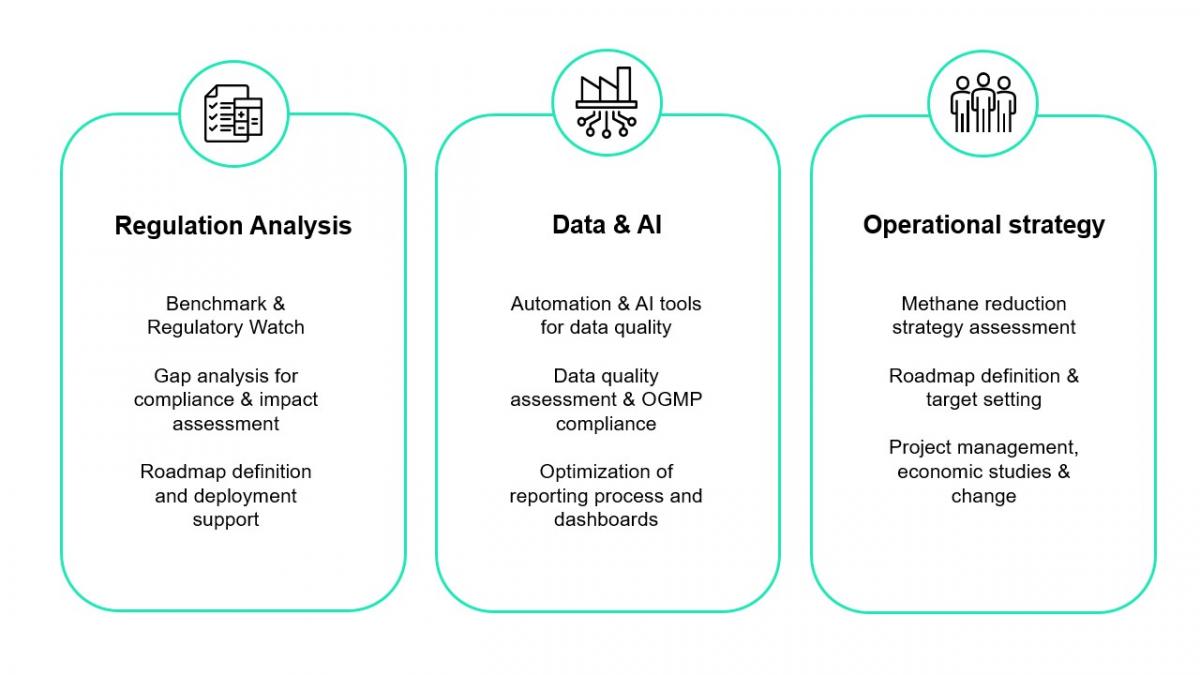Agentic AI: Are you ready?

Reducing methane emissions is a crucial environmental challenge. At Sia Partners, we support our clients in achieving their methane emission reduction targets and developing effective strategies to minimize their environmental impact.

Methane emissions originate from a wide range of sectors, including agriculture, waste, and energy. Accounting for roughly a third of global warming, methane is the second most significant greenhouse gas after carbon dioxide. However, despite having a shorter lifespan in the atmosphere, methane has a significantly higher warming potential than carbon dioxide. As a result, the International Energy Agency believes that reducing methane emissions is a highly effective short-term approach to tackling global warming.
The energy sector, contrary to other emitting sectors, has the advantage of benefiting from concrete technical solutions enabling it to significantly limit methane emissions into the atmosphere. Consequently, targeting methane emissions from the energy industry represents one of the best near-term opportunities in climate change mitigation.
Ambitious goals and standards have been set and will most likely be strengthened over the coming years. Notably, these include the Global Methane Pledge signed during the COP26 in 2021. However, energy operators must anticipate more restrictive regulations and must continuously strengthen their efforts to reduce methane emissions.
Despite widespread awareness of fugitive methane emissions and commitments from many players to reduce these emissions, major challenges remain:
Strategic constraints: Actors must balance energy security with climate and energy transition efforts, particularly in reducing methane emissions.
Operational constraints: Difficulty in detecting and quantifying methane emissions, selecting and implanting the optimal technical solution, and establishing dedicated organizations for methane mitigation.
These parameters can make the implementation of a methane emissions reduction strategy a complex and challenging issue for energy players.
Sia Partners already supports industrial players in their low carbon strategy and especially energy operators with their efforts in reducing methane emissions. By anticipating upcoming changes, we help them prepare for regulatory, data, and operational management aspects of methane mitigation. Our services cover all aspects of methane mitigation processes including leak detection and repair strategies, venting and flaring process adaptation, source-level and site-level strategies, data emission monitoring, regulatory impact assessments and technical project management. Furthermore, since 2020 Sia Partners has been helping clients prepare OGMP 2.0 reports and annual Implementation Plans, contributing to their certification by the OGMP Gold Standard (Oil and Gas Methane Partnership).
At Sia Partners, we believe that developing an optimal strategy for reducing methane emissions requires a thorough analysis of existing internal processes and real impacts in the field. This involves engaging in a dialogue with operational staff and getting as close as possible to methane emission sources to understand reduction levers.
Our expertise in methane emission strategies has led us to develop a unique approach to supporting energy players and helping them achieve their methane emission reduction goals at different scales.
